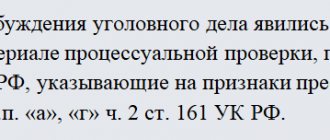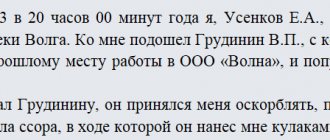Not all citizens of our country are satisfied with the work of law enforcement agencies, and indeed, often in response to an appeal for restoration of justice, a resolution is issued refusing to initiate a criminal case. The Code of Criminal Procedure of the Russian Federation provides for situations when this document can be challenged. Let's look at them in more detail.
What does the Resolution on refusal to initiate criminal proceedings contain - an example
The sample Resolution is regulated by Article 148 of the Code of Criminal Procedure. It also contains requirements for its content. It has three parts.
The introductory part contains the document number, the date and place of its preparation, the position, rank and surname of the person who made the decision. The reason and materials on which the refusal was issued are also indicated here. At the same time, when formulating the name of the materials of the inspection carried out, the person drawing up the Resolution should not use an accusatory orientation in it (not “materials about the crime of Mr. Petrov K.K.”, but “materials about the theft of a vehicle of Mr. Sidorov N. E.” .").
The second part is descriptive. It contains information supported by evidence that was clarified during the audit.
In the final part, it is concluded that there was no corpus delicti in the actions for which the audit was carried out. This conclusion is supported by the specific articles of the Code of Criminal Procedure of the Russian Federation that serve as its basis.
The document is certified by the signature of the official who compiled it. Specific examples of Resolutions to refuse to open a criminal case can be found on the pages of Internet sites.
After the Resolution is issued, the applicant is notified of the decision made. Another copy is sent to the prosecutor.
Corpus delicti
In order for a criminal case to be opened based on a statement, it is first necessary to prove that a certain set of events took place, known in the Criminal Code as the elements of a crime. It includes characteristics of both the action that occurred and the person who performed this action. According to all the canons of criminal law, this concept includes four mandatory components.
- The object of the crime is what the criminal is attempting to destroy (in case of theft, this is property, in case of murder, life, in case of violence, sexual integrity).
- The objective side is the presence of an unlawful act, that is, the commission of a specific action (or inaction) that poses a social danger and is prohibited by the Criminal Code (directly theft, murder, violence).
- The subject is a capable citizen who has reached the age that allows him to bear criminal responsibility.
- The subjective side is the criminal’s awareness of the illegality of his actions or the ability to foresee that his actions may have dangerous and illegal consequences.
It should be noted that if at least one of the above four points is missing, there is no corpus delicti, then the investigator or inquiry officer has the right to issue a Resolution refusing to initiate a criminal case. An example of such a situation is very easy to find. In relation to a minor, such a decision will be made until he reaches 16 (in special cases - 14) years.
What is a crime
The law understands a crime as a violation of the law that entails grave consequences. It should be understood that the consequences of crimes will always be severe in terms of the degree of damage to protected rights and freedoms.
The division of crimes into grave, especially grave, or moderate gravity is a way of dividing criminal acts among themselves within the framework of the Criminal Code, and not an attempt by the legislator to separate non-dangerous and dangerous criminal acts. That is, among the dangerous consequences there are grave and less grave ones, and to put it simply, there is a Criminal Code for dangerous offenses, and a Code of Administrative Offenses for non-dangerous ones.
Most common reasons for refusal
Code of Criminal Procedure of the Russian Federation, namely Art. 24 clearly defines the circumstances when a criminal case is not initiated in response to a citizen’s action.
- In the absence of a crime event, that is, the criminal act itself was not committed. An example of such a circumstance would be evidence that the cause of death of the victim was not murder, but suicide.
- If there is no corpus delicti in the action, this formulation is issued if a crime has been committed, but there is no corpus delicti in the actions of the suspect. This is possible when, under the given circumstances, the person’s actions were lawful (necessary self-defense), in the absence of mandatory elements that are part of the crime (murder in the absence of intent, that is, through negligence). Also, a decision to refuse to initiate a criminal case is made if the act does not pose a public danger (Article 14, Part 2 of the Criminal Code). The same decision is made in the case of voluntary refusal to complete the crime (Article 31 of the Criminal Code), commission of a crime in a state of insanity (Article 21 of the Criminal Code), if the age of the person who committed the unlawful act is lower than the age at which criminal liability arises (in In the Russian Federation it is 16, but for especially serious crimes it can be reduced to 14 years) (Articles 20, 30 of the Criminal Code).
Application to the prosecutor's office to initiate a criminal case
To the Prosecutor of the Republic of Dagestan ___________________ ———————————————————
To the prosecutor of the _________ district of the city___________ ——————————————————
To the head of the _________ Department of Internal Affairs of the city___________
STATEMENT
_______________ year, in his apartment at _____________________, the body of _____________, _____ year of birth, was found with signs of violent death. The body had signs of beatings and a knife wound. A group of employees of the police department and the prosecutor's office of the __________ region arrived at the scene of the incident. The arriving law enforcement officers did not take any investigative actions, citing the presence of an unpleasant odor in the apartment and the inability to work. Indeed, the body lay in the apartment for about two days. However, there was material evidence in the apartment that law enforcement officials ignored, namely: a knife with traces of blood, four glasses that could have fingerprints of possible criminals, cigarette butts in the ashtray, despite the fact that the deceased did not smoke. Moreover, there were also witnesses willing to testify about this incident. All of the above circumstances were ignored by the police. Experts were not invited to examine the body and determine the cause and time of death, and prints were not taken from glasses, cigarette butts and a knife. No attempt was made to locate or interview possible witnesses. The relatives of the deceased themselves invited doctors, who examined the body and explained that death occurred as a result of a knife wound to the groin artery, as a result of which the deceased bled to death and died. The police officers gave the relatives of the deceased some papers to sign and left the scene. However, they still do not know what exactly they signed, since at that moment they were in such a state that they could not adequately perceive the situation. At present, I assume that this was a refusal to conduct an investigation and initiate a criminal case, since no measures have yet been taken to investigate. I believe that in this case there are signs of a crime under Article 105 of the Criminal Code of the Russian Federation. I ask you to consider my application on the merits and make a decision to initiate criminal proceedings.
_____________, live. _______________________
More reasons for refusal
In addition to the most common ones, there are a number of other reasons that serve as the basis for adopting a resolution to refuse to initiate a criminal case. An example of such circumstances is described in detail in the Criminal Code of the Russian Federation. In particular, these include the following situations.
- Expiration of the statute of limitations - A decision to refuse to initiate a criminal case for this reason can be made only if the perpetrator made no attempt to escape criminal prosecution. Otherwise, statutes of limitations are not taken into account.
- No criminal case is initiated against the deceased. This basis can only be changed if the consideration of the case is necessary for his rehabilitation.
- In private cases, criminal prosecution is not initiated without a statement from the victim. The exception is when the initiative comes from the prosecutor or investigator (inquiry officer) with the consent of the prosecutor.
- A criminal case against persons for whom a special procedure for conducting criminal cases is legally established (senior government officials, judges, prosecutors, etc.) is not initiated without a court decision or their consent.
Subject
The subject is the person who committed the act. Moreover, this person must meet the following characteristics:
- to be sane, that is, to be accountable for one’s actions;
- be over the age of 14 years, if the act is provided for in Part 2 of Article 20 of the Criminal Code of the Russian Federation;
- be over the age of 16 years, if the act is not included in the category of grave crimes provided for in Part 2 of Article 20 of the Criminal Code of the Russian Federation;
- be alive because criminalizing the dead is unacceptable.
Applicant's liability
When contacting law enforcement authorities with a statement about accusing a specific person or group of people of a crime, you should remember that this is a fairly serious action. If the inspection did not find confirmation of the indicated facts and, based on its results, a decision was made to refuse to initiate a criminal case, a sample of the collected materials can be transferred for consideration of the issue of initiating a counter criminal case, where a charge of knowingly false denunciation will be brought.
How not to get unsubscribed
I do not exclude the possibility that your first letters to the prosecutor will end in receiving a formal response. This occurs due to a lack of understanding of the jurisdiction in considering those issues that are sent to this structure. Over time, you will become clearer in which cases a direct appeal to the prosecutor is more effective, and in which cases preliminary correspondence with third-party organizations is required. That is why here I have tried to outline in detail how to correctly file an appeal to the prosecutor’s office, a sample of which is given above.
I wish you good luck and perseverance in defending your interests!
Initiation denied. What to do?
So, you have received a Resolution to refuse to initiate criminal proceedings. The form of this document with explanations about the possibility of appeal is usually sent by letter. This can be done, although it is not easy. First of all, you should familiarize yourself with all the materials that were collected when checking your application. To do this, an application must be sent by registered mail with a notification that it was delivered to the office of the body where the employee who refused to initiate the case serves, addressed to the boss, in which you ask permission to familiarize yourself with the materials collected during the inspection. The application is drawn up in any form, but the following information must be present:
- your status - are you an applicant or a person in respect of whom an inspection was carried out;
- date of filing and essence of the application;
- date, number of the inspection performed (they are indicated in the Resolution);
- request to familiarize yourself with the inspection materials and use technical means;
- link to part 2 of article 24 of the Constitution of the Russian Federation.
You can submit the application in person, but it will be better if you prepare it in two copies, hand over the first to the office, and on the second the person who accepted it from you must put a mark of acceptance, which will indicate the date and incoming number.
Subjective side
In essence, the subjective side is the subject’s attitude towards what he has done. It is on the subjective side that the differentiation of intentional crimes from careless ones is made.
That is, the investigator must answer the question “whether the subject wanted criminal consequences to occur.” If he wanted to and acted consciously, then there is an intentional crime.
But in the case of “didn’t want to” everything is much more complicated. Because the subject might not want to, but allow the consequences to occur. And he could not only not want, but not even allow the possibility of their occurrence.
Here are some examples:
- The forester surrounded the guardhouse with wire, applied voltage to it and hung a sign “Caution! Current! He will kill! Two children who could not read decided to climb over the wire and were electrocuted. In this case, the forester, although he did not want such consequences to occur, but had to admit that they could occur;
- the same forester received leave and went to the sea, having previously de-energized the house and the wire around it with a switch and removed the warning sign. The thief who got into the house decided to turn on the light and switched the switch to working condition. He left the house with the stolen things and saw two children electrocuted on a wire. In this case, a criminal case will be brought against the thief for theft, but as for the children, he cannot be held responsible for their death, since he did not know that electricity was supplied to the wire.
Now let’s look at how the subject and the subjective side are connected in the event that a person is declared insane by an expert examination.
Due to insanity, a person not only does not control his actions, but also cannot really assess the possible consequences. Therefore, in relation to the insane, either a decision is made to refuse to initiate a criminal case, or it is terminated.
Familiarization with inspection materials
In response to the application, information will be sent containing the place and time when the familiarization will take place. As a rule, this happens where the resolution to refuse to initiate criminal proceedings was adopted. It is best not just to read the documents, but to make photocopies of them (the application specifically indicated the clause on technical means). In the future, this will greatly facilitate the justification of the appeal. And it is not necessary to make this visit in person. If you have a power of attorney, your representative can do this. Please note: parents or guardians of minors do not need this. They only need a birth certificate or a document confirming the right to represent the interests of the child.
An object
When identifying the object of a crime, the investigator must answer the question whether there is some right protected by law that was encroached upon by the act.
Let's give an exaggerated example. A certain person publicly threatened to kill the Martian. Formally, threats to kill are an article of the Criminal Code. However, since Martians do not exist at all, the law cannot protect their rights. Consequently, the actions of the person making the threat do not constitute a crime, and the initiation of a criminal case will be refused.
Drawing up a complaint
After the inspection materials have been carefully studied, you can begin to draw up a complaint. It is better if a legally competent person who knows criminal law does this. In this case, an appeal against the decision to refuse to initiate criminal proceedings will have a greater chance of success. The complaint must be short and clear. When working on its text, you should not make it emotional; what looks good in regular correspondence is not always appropriate in an official document. The text of the complaint should be short. Another important quality of this document should be the validity and motivation of the complaint.
Application to the prosecutor's office - sample
Thus, the complaint can be divided into:
- statement header
- main part: the essence of your complaint or suggestion
- a specific request regarding how you see the solution to the problem presented: bringing the offender to justice, stopping the offense, returning the organization’s activities to the legal channel, recognition of the status or right, etc.
As a guide, I’ll give an example: an appeal to the prosecutor’s office, a sample of a real statement:
Contents of the complaint
Like any document, the complaint has its own procedure for drawing up, and it must contain the following information:
- address and name of the authority where it is submitted;
- address and details (full name) of the applicant;
- information about the applicant's procedural status;
- information about the Resolution that you want to appeal;
- arguments in favor of your application, supported by references to the Code of Criminal Procedure and the materials of the audit;
- an indication of exactly which rights were violated (most often they refer to Articles 45 and 46 of the Constitution of the Russian Federation);
- list of the applicant's requirements.
The complaint must try to prove that the decision was made prematurely and unreasonably, that is, the data presented in the inspection materials was not sufficient to study the facts specified in the statement of crime. It is also necessary to pay attention that the reasons that the investigator or interrogator was guided by are unmotivated and do not comply with the articles of the Code of Criminal Procedure of the Russian Federation. The content of the complaint should not only refute the arguments of the investigator who conducted the inspection and his conclusions, but also cite those facts that were not reflected in its materials. Once you have drawn up the document, do not forget to sign it.
Procedure for contacting the prosecutor's office
You can contact the department in two ways:
- Traditional written submission of an appeal
- Submit a complaint to the prosecutor's office online
The request may take the form:
- Complaint: a request for restoration or protection of violated rights, freedoms or legitimate interests or the rights, freedoms or legitimate interests of other persons;
- Proposal: recommendations for improving laws and regulations, the activities of government bodies, improving the activities of the state, etc.;
- Application: a request for assistance in the implementation of constitutional rights and freedoms, or a report of violations of laws, shortcomings in the work of government agencies, local governments and officials, or criticism of their activities;
- Petition: the applicant for recognition in cases established by the legislation of the Russian Federation of a certain status, rights, freedoms;
- Collective appeal: an appeal by two or more persons or an appeal adopted at a rally or meeting and signed by the organizers or participants of the rally or meeting.
Where to send a complaint
According to the norms of the Code of Criminal Procedure of the Russian Federation, a citizen can send a complaint either to the immediate supervisor of the person who issued the Resolution, or to the judicial authorities. If a citizen decides to send a complaint to the prosecutor's office or the Investigative Committee, three days are allotted for its consideration. In some cases, this period may be extended to five days. When filing a complaint, you need to know exactly who to address it to, since if it is transferred to the prosecutor and recognized by him as competent, then it is within his competence to cancel the Resolution, which was made only by the investigator. In the event that the decision was made by the investigator, the prosecutor can only convey the presentation to the head of the investigative body, and he has the right to disagree with it. Thus, if the Resolution was made by the investigator, it is more reasonable to send the complaint to the immediate supervisor of the investigative body in which he serves.
What you need to know when approaching the prosecutor's office
The Prosecutor's Office of the Russian Federation is a federal structure for supervision of Constitutional rights, the freedom of citizens and the implementation of laws on the territory of our state. It includes military, law enforcement and civilian prosecutors' offices.
This service also monitors the implementation of the provisions of the law by state, federal, commercial structures, but at the same time its divisions “do not replace other government bodies and officials who monitor the observance of human and civil rights and freedoms, and do not interfere in the operational and economic activities of organizations “, - according to paragraph 2 of Article 26 of the Federal Law “On the Prosecutor’s Office of the Russian Federation” N 2202-1.
In other words, the supervisory service monitors the implementation of the law by state subjects and its citizens, but does not assume the functions of relevant departments. For example, failure to fulfill contractual obligations for the heat supply of an apartment building by a boiler house should be resolved primarily with its manager. If the dispute cannot be resolved or, as most often happens, you have not received any response, then you need to file a complaint with the prosecutor’s office against the management company. More on this below.
Judicial appeal
If a citizen decides to appeal the Resolution in court, the complaint is filed with the court at the place of the investigation. Five days are given for its consideration.
But it's not that simple. Even if the court takes your side, the decision to refuse to initiate criminal proceedings will not be automatically cancelled. According to the court's decision, another inspection will be carried out, and based on its results a decision will be made again. If an employee of the investigative agency takes your arguments into account and agrees with them, a criminal case will be opened, but it is also possible that a second refusal will be issued.
Consideration of citizens' appeals to the prosecutor's office
Any applications submitted properly will be considered. Based on the results of the preliminary review, one of the following decisions may be made:
- hired;
- left unsatisfied;
- transferred to lower prosecutors;
- sent to other authorities;
- consideration is terminated;
- attached to a previously registered application;
- returned to the applicant.
A registered application is resolved within 30 days. If the application does not require additional study and verification, then within 15 days. If the complaint requires additional verification, the period may be extended, but not more than 30 days. You will be notified of this in a separate notification.
If the text of the application is not readable, no response will be given. If your name and address can be read, you will be notified within 7 days of registration.
Appeals in which there is not enough information sufficient to resolve the issue, or the employee cannot understand the essence of the request, are also returned within 7 days with an offer to fill in the missing data.







